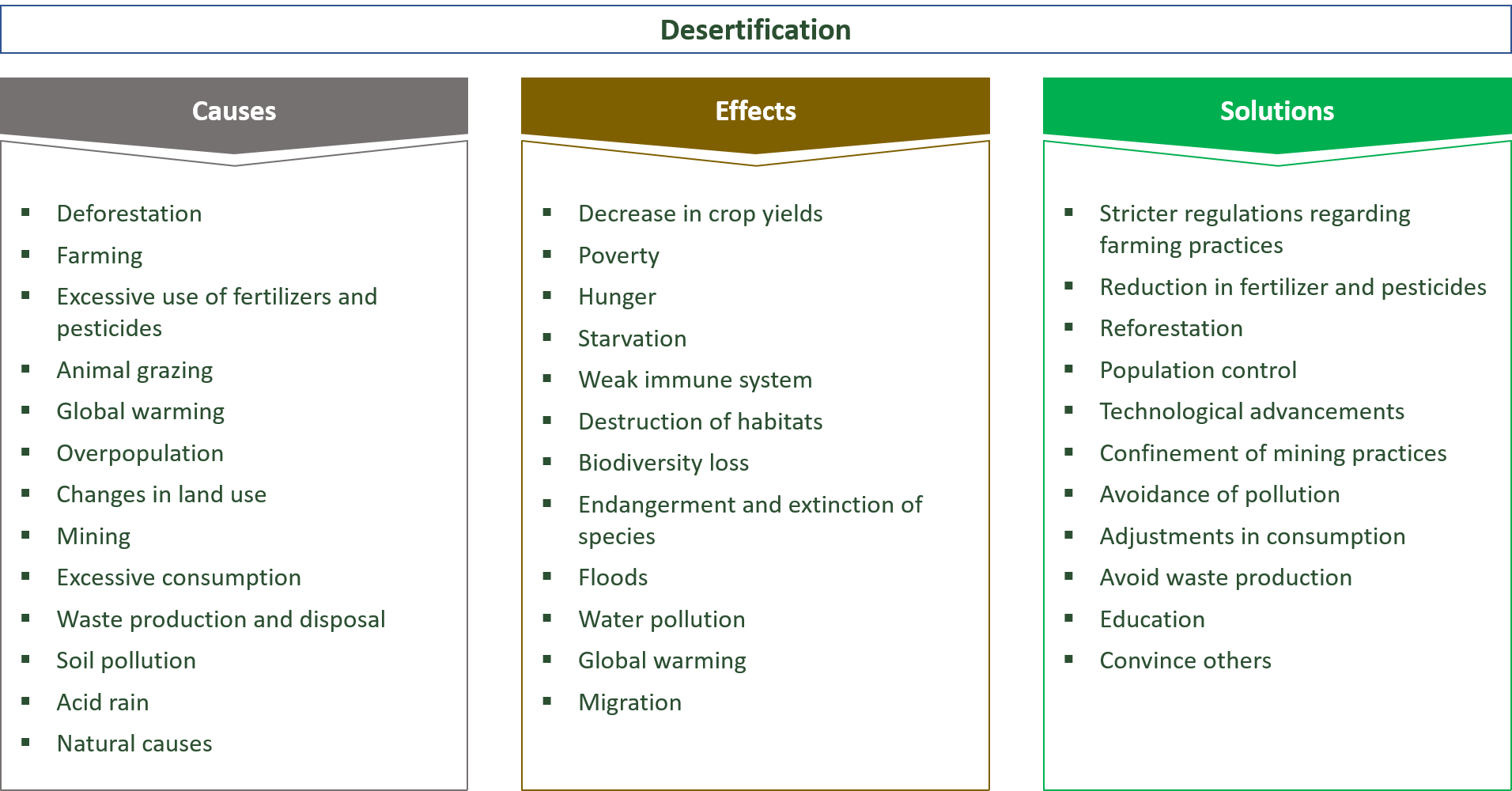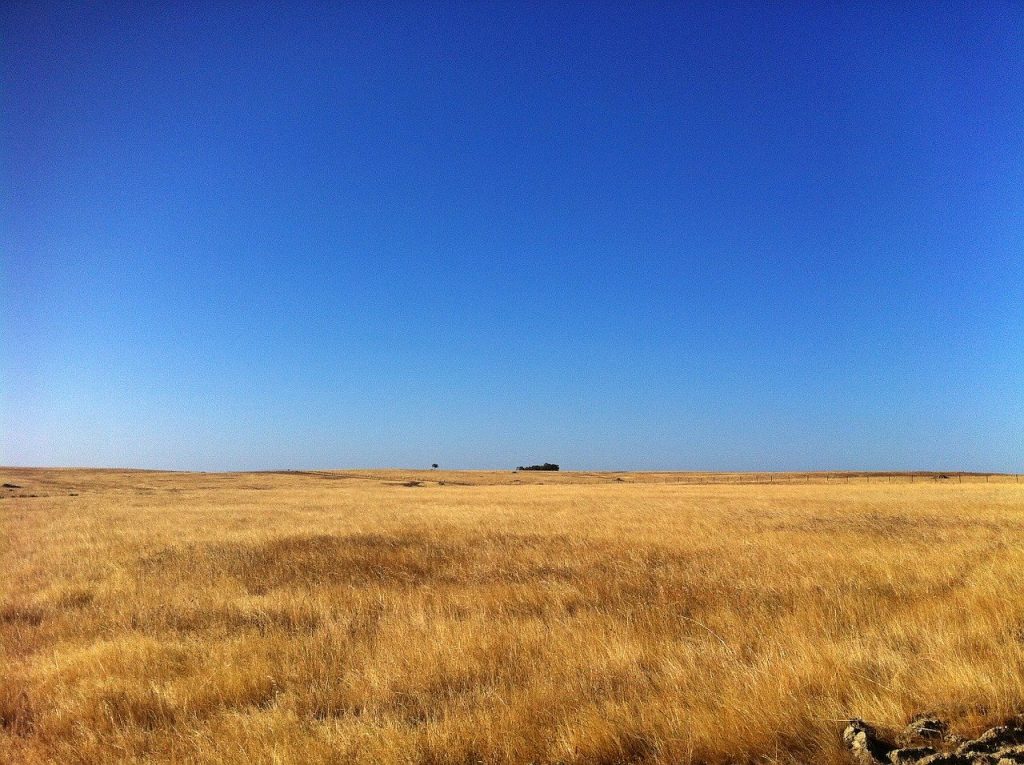“We already have the statistics for the future: the growth percentages of pollution, overpopulation, desertification. The future is already in place.”
Gunter Grass, Author
Desertification: Causes, Effects & Solutions

Desertification can be defined as land degradation implying the loss of biological productivity due to the development of land into an arid desert-like environment.
Desertification is a big global problem, which will become even worse due to the effects of global warming.
Millions of people will likely lose their livelihood and will have to migrate to foreign countries in order to survive.
In this article, the causes, effects and solutions for desertification are examined.
Audio Lesson
Contents
Causes for Desertification
- Deforestation
- Farming
- Excessive use of fertilizers and pesticides
- Animal grazing
- Global warming
- Overpopulation
- Changes in land use
- Mining
- Excessive consumption
- Waste production and disposal
- Soil pollution
- Acid rain
- Natural causes
Deforestation
One significant cause of desertification can be deforestation.
By cutting or burning down forests, the area that has previously been planted with trees can now be used for farming or other purposes.
However, if this area is not used for other purposes for some reason, chances are that this area turns into arid land.
Moreover, even if this area will be used for farming purposes, it may become desert-like in the long run since our nowadays farming practices are often not sustainable and can be quite harmful to the soil.
Farming
Since in our nowadays world, farming practices are fully optimized for the highest possible yields, this also often implies significant damage to the soil.
In many areas, farmers only plant certain kinds of plants for many years, which leads to an extraction of plenty of precious resources and minerals out of the ground.
Sooner or later, due to the excessive farming of only of few plant species, the soil will no longer be suitable for farming since too many minerals have been used and the land has become arid.
Excessive use of fertilizers and pesticides
Moreover, many farmers use excessive amounts of fertilizers and pesticides in order to maximize their crop yields in the short term.
However, in the long run, this often leads to significant damages for the soil, which may turn from arable into arid land over time.
In turn, this often also implies that the former arable land will be no longer suitable for farming purposes after a few years of excessive farming since the soil has been damaged too much over time.
Animal grazing
Grazing can be regarded as natural behavior of many animals like cows or sheep.
However, excessive numbers of animals like in factory farming may lead to excessive levels of grazing, which in turn may lead to the desertification of the grazing areas since plants have no chance to recover in population and may also eventually die off due to excessive manure from those animals.
Therefore, also the excessive cultivation of cattle can lead to significant problems with desertification in the long run.
Global warming
Due to an increase in air temperature due to global warming, water will become a scarce resource in many parts of our planet.
Especially in the Southern hemisphere, water shortages will be a big issue.
Many farmers who currently already struggle to find enough water for farming purposes will suffer even more in the future.
This in turn implies that large areas of land that have been used for farming in the past will become arid and will no longer be suitable for farming anymore due to a lack of water.
This in turn will lead many people to leave the affected areas and the soil in those areas will suffer from significant desertification.
Overpopulation
Another contributor to desertification is overpopulation.
Since our world population is continuously growing, the demand for material goods is also increasing at an alarming rate.
Also, our global demand for food is increasing.
In turn, this implies that we have to optimize our farming processes even further in order to harvest even higher crop yields.
However, this excessive optimization of farming will hurt the soil and will eventually turn into the desertification of land in the long run.
Changes in land use
While in previous times, we had plenty of untouched natural areas on our planet, this changed dramatically over time.
In our current age, large areas of forests have to be cut down or burned in order to get more space for farming to produce enough food for our growing world population.
This change in land use also implies a higher chance for the desertification of certain areas since nature is often not able to sufficiently recover from human intervention.
Mining
Another big reason for desertification is mining.
For mining, large areas of land have to be used.
In turn, this also often implies significant deforestation.
Mining also often implies the pollution of nearby areas.
In turn, once most of the natural resources have been extracted and mining is no longer profitable in the respective area, chances are that this area will suffer from significant levels of desertification since our mining practices may have hurt the soil too much and may not be able to recover.
Excessive consumption
Our overall level of consumption is increasing at a steady rate.
This is due to a growing world population, but also due to the fact that everyone of us always wants to have the newest and hippest stuff, which leads to excessive consumption levels.
However, in order to meet the demand for material goods, large amounts of resources have to be processed by industries.
In order to extract those resources, we have to mine large areas of land, which may turn into arid land once those mining processes have been finished.
Waste production and disposal
Excessive consumption behavior also implies the production of large amounts of waste.
However, in order to get rid of this waste, it has either to be burned or disposed into landfills.
Burning waste implies the emission of harmful gases into our atmosphere, which may contribute to global warming and also imply the formation of acid rain.
The disposal of waste into landfills may lead to serious soil pollution.
All this may hurt the soil in the long run to an extent where the former arable land will now turn into arid land due to soil pollution and a significant change in the acidity level of the soil, which may lead to the extinction of many plant species.
Soil pollution
Soil pollution in general can be regarded as significant cause for desertification.
Many plants are quite sensitive to their natural living conditions.
If the soil becomes polluted due to various man-made reasons, chances are that the respective area of land may suffer from significant desertification in the long run.
The higher the level of pollution, the more the soil will suffer over time.
Acid rain
In our current age, acid rain has become a significant environmental issue.
Although not considered to be a big problem by the general public, acid rain can alter the natural conditions of many plants and may lead to a serious decrease in crop yields over time.
In the long run, acid rain can also contribute to desertification, since if the alteration of the acidity level of the soil is sufficiently high, many plants may no longer be able to grow properly and may eventually even die off.
Natural causes
Apart from man-made issues, desertification can also be caused by natural phenomena.
For instance, natural disasters may also contribute to desertification of the affected areas of land.
For instance, through the eruption of a volcano, the magma may destroy many trees and plants.
This may lead to the desertification of land in the short term.
However, in the long term, it is likely that those areas of land will recover in a natural manner.

Effects of Desertification
- Decrease in crop yields
- Poverty
- Hunger
- Starvation
- Weak immune system
- Destruction of habitats
- Biodiversity loss
- Endangerment and extinction of species
- Floods
- Water pollution
- Global warming
- Migration
Decrease in crop yields
A major effect of desertification is the decrease in crop yields.
Once land turns from arable to arid, it is often on longer suitable for farming purposes anymore.
In turn, many farmers may lose their livelihood, since they often solely rely on farming as their single source of income.
If their land becomes arid, they may no longer be able to provide sufficient crop yields to make a living out of it.
Poverty
Desertification may also lead to serious levels of poverty.
For instance, in many poor areas, people are dependent on the crop yields of farmers in order to be able to ensure their food supply.
However, if crop yields drop significantly due to desertification issues, many people may lose their livelihood and may be trapped in poverty.
Moreover, many people are also employed by farmers.
If these people lose their jobs due to desertification, the poverty issue may even be exacerbated.
Hunger
Poverty caused by desertification may also lead to serious levels of hunger.
If the local population is no longer able to buy vegetables or fruits from farmers due to insufficient crop yield, chances are that many people in poor regions may not be able to get enough food.
This is especially true for quite remote regions that solely rely on agriculture as their food source.
Starvation
In extreme cases, poverty and hunger may also turn into starvation.
Many people may die from the direct and indirect consequences of desertification.
Especially in areas that have been poor for a quite long time, people in those areas often do not have any savings and may no longer be able to get enough food due to the desertification issue, which may take the life of a high number of people.
Weak immune system
Hunger caused by desertification may also lead to a weak immune system for people living in affected areas on our planet.
Our body only works properly if it is supplied by sufficient vitamins, minerals and energy.
If this is not the case due to insufficient food supply, chances are that our body is more vulnerable to diseases.
In turn, even rather harmless diseases may take the life of many people since their immune system has become quite weak over time and the body may simply be no longer able to defend against the bacteria.
Destruction of habitats
Desertification may also lead to a loss of habitats for many animals and plants.
Since the local flora and fauna is often quite sensitive to changes in their natural living conditions, desertification may alter their living conditions in a way that makes it impossible for animals and plants to sustain their populations.
For instance, if some regions suffer from water shortages due to climate change, animals in those regions may suffer from the resulting desertification and may also die since water is vital for all life on our planet.
Biodiversity loss
In general, the destruction of habitats and the desertification may also contribute to a loss of biodiversity.
While some species may be able to adjust to the altered environmental conditions properly, many species will not be able to do so and may suffer from serious declines in population.
Endangerment and extinction of species
If the decline in population is severe enough, species may become endangered or even extinct.
This problem is especially severe for species that are already endangered.
Due to desertification, the small number of remaining animals or plants may also die off over time, which may even lead to the extinction of species due to desertification.
Floods
Desertification may not only lead to droughts and the resulting adverse consequences, it may also contribute to floods.
Since areas that suffer from desertification usually do not have any trees or other bigger plants in place anymore, these areas are more vulnerable to floods and erosion since there is no vegetation which could hold the soil together.
Water pollution
Since an intact soil and plants filter our water, the absence of those factors due to desertification may lead to serious water pollution.
This can be a serious issue, since in many areas worldwide, people rely on clean groundwater for showering and cooking purposes.
Global warming
Since desertification often implies that trees and other plants die off, it also indirectly contributes to global warming.
Since trees are a natural storage space for greenhouse gases like carbon dioxide, if these trees die off, large amounts of greenhouse gases that had been stored in those trees are now emitted into our atmosphere, which accelerates global warming and the dramatic adverse effects.
Migration
Since desertification implies the destruction of the livelihood of many farmers, it also contributes to serious migration movements.
This problem will become even worse since due to global warming, large areas of land that are currently used for farming will then no longer be suitable for farming due to a lack of water.

Solutions for Desertification
- Stricter regulations regarding farming practices
- Reduction in fertilizer and pesticides
- Reforestation
- Population control
- Technological advancements
- Confinement of mining practices
- Avoidance of pollution
- Adjustments in consumption
- Avoid waste production
- Education
- Convince others
Stricter regulations regarding farming practices
In order to fight desertification, it is crucial that there are quite strict regulations in place that limit the use of manure.
Moreover, farmers should be forced to switch the sort of plants once in a while so that the soil is able to recover.
By introducing those measures, farming will become much more sustainable since the soil is protected from excessive use and contamination, which will prevent desertification in many cases.
Reduction in fertilizer and pesticides
In general, farmers should reduce their use of fertilizer and pesticides.
In the past decades, there has been a development towards the excessive use of fertilizers and pesticides in farming in order to maximize crop yields.
However, since those chemical substances often hurt the soil and turn the land from arable to arid, there should be a reduction in the use of pesticides and fertilizers in order to prevent desertification and several other environmental issues.
Reforestation
In areas that have been subject to deforestation in the past, it should be considered to plant trees in those areas instead of using those areas for other purposes which may turn them into arid land in the long run.
Our forests are quite important since they contribute to a natural balance and provide a habitat for many animals and plants.
Moreover, they are considered to slow down global warming since trees are natural carbon dioxide storage spaces.
Therefore, it might make sense to fight deforestation and plant trees in the affected areas, not only to prevent desertification but also to fight additional environmental issues.
Population control
Since overpopulation indirectly contributes to desertification through excessive pollution and a contribution to global warming, population control measures should be taken in order to mitigate this issue.
For instance, this could mean setting restrictions for the number of children a family is allowed to have.
By doing so, we could reduce the number of people on our planet in a natural manner, which would fight important environmental problems, including resource depletion and also the desertification issue.
Technological advancements
Research is key to overcome most of our environmental problems.
This is also true for the desertification issue to a certain extent.
By using latest research findings, we will be able to improve our knowledge regarding the drivers of desertification and can take appropriate and effective measures on an individual basis.
Confinement of mining practices
Since mining often implies the destruction of large areas of land, mining practices should be confined by governments so that our nature reserves stay intact and the natural habitats of many animals and plants can be protected.
By doing so, less land will be arid after mining practices have been finished and the desertification issue can be mitigated to a certain extent due to a reduction in mining actions.
Avoidance of pollution
Since pollution of many sorts can directly and indirectly hurt the soil, it can significantly contribute to the desertification issue.
Therefore, it is crucial that we reduce pollution on a global scale, not only to reduce the desertification problem but also to fight several other environmental problems our planet currently faces.
Adjustments in consumption
Our consumption behavior is a main problem for the sustainability of our environmental system.
It also contributes to desertification since excessive consumption contributes to the emission of greenhouse gases, which in turn contributes to global warming.
Global warming exacerbates the desertification issue since it will lead to water scarcity in many regions on the Southern hemisphere, which will make it impossible for farmers to continue their farming practices.
Therefore, it is crucial to adjust our consumption to a more sustainable level in order to fight desertification.
Avoid waste production
Similar to the consumption issue, we should also try to avoid waste on a daily basis, since it indirectly contributes to the desertification problem.
This means that you should not buy products that are excessively packaged.
Instead, try to buy from local organic food stores and bring your own bag.
There are several other ways how you can reduce waste in your daily life, just think about the consequences for our planet when it comes to buying decisions of several sorts.
Education
Education is quite important to fight our environmental issues.
Children should be taught from an early age on how our daily behavior affects our planet and how everyone of us can reduce the desertification issue.
By educating these children, they are more likely to behave in an eco-friendly manner.
Moreover, once they turn into grownups, they are also more likely to behave in a greener way.
Convince others
If you want to multiply your positive impact on our environment, you should also try to convince others about our environmental problems and solutions by showing your family and friends easy measures how we can all improve our ecological footprint.
Conclusion
Desertification is a significant environmental problem, which will likely become worse in the future due to global warming.
In order to mitigate the adverse effects of desertification, governments all over the world have to set strict regulations.
Moreover, industries and also everyone of us can make a positive contribution to fight desertification and to ensure a livable future for billions of people on our planet.
Sources
https://en.wikipedia.org/wiki/Desertification
https://www.nationalgeographic.com/environment/habitats/desertification/

About the author
My name is Andreas and my mission is to educate people of all ages about our environmental problems and how everyone can make a contribution to mitigate these issues.
As I went to university and got my Master’s degree in Economics, I did plenty of research in the field of Development Economics.
After finishing university, I traveled around the world. From this time on, I wanted to make a contribution to ensure a livable future for the next generations in every part of our beautiful planet.
Wanna make a contribution to save our environment? Share it!
